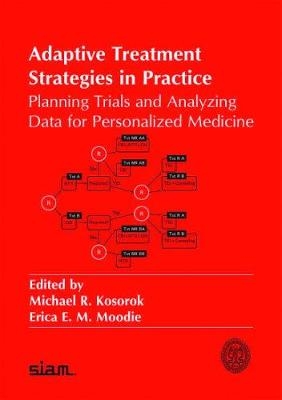
Adaptive Treatment Strategies in Practice
Society for Industrial & Applied Mathematics,U.S. (Verlag)
978-1-61197-417-1 (ISBN)
Personalized medicine is a medical paradigm that emphasizes systematic use of individual patient information to optimize that patient's health care, particularly in managing chronic conditions and treating cancer. In the statistical literature, sequential decision making is known as an adaptive treatment strategy (ATS) or a dynamic treatment regime (DTR). The field of DTRs emerges at the interface of statistics, machine learning and biomedical science to provide a data-driven framework for precision medicine. A learning-by-seeing approach to the development of ATSs is provided in this book. While estimation procedures are described in sufficient heuristic and technical detail, so that less quantitative readers can understand the broad principles underlying the approaches, practices can also be implemented by more quantitative readers. As the most up-to-date summary of the current state of statistical research in personalized medicine, this book is ideal for a broad audience of health researchers.
Michael R. Kosorok is W. R. Kenan, Jr Distinguished Professor and Chair of Biostatistics and Professor of Statistics and Operations Research at the University of North Carolina, Chapel Hill. He is an honorary fellow of both the American Statistical Association and the Institute of Mathematical Statistics and an Associate Editor of The Annals of Statistics, the Journal of the American Statistical Association, and the Journal of the Royal Statistical Society, Series B. He is the contact principal investigator for a program project (P01) from the US National Cancer Institute, entitled 'Statistical Methods for Cancer Clinical Trials'. His main research interests are in precision medicine, clinical trials, machine learning, and related areas. Erica E. M. Moodie is a William Dawson Scholar and an Associate Professor of Biostatistics in the Department of Epidemiology, Biostatistics and Occupational Health at McGill University. She is an Elected Member of the International Statistical Institute, and an Associate Editor of Biometrics and the Journal of the American Statistical Association. She holds a Chercheur–Boursier Junior 2 career award from the Fonds de Recherche du Québec-Santé. Her main research interests are in causal inference and longitudinal data, with a focus on dynamic treatment regimes.
List of contributors; List of figures; Preface; 1. Introduction M. R. Kosorok and E. E. M. Moodie; Part I. Design of Trials for Estimating Dynamic Treatment Regimes: 2. DTRs and SMARTs: definitions, designs, and applications K. M. Kidwell; 3. Efficient design for clinically relevant intent-to-treat comparisons R. Dawson and P. W. Lavori; 4. SMART design, conduct, and analysis in oncology P. F. Thall; 5. Sample size calculations for clustered SMART designs P. Ghosh, Y. K. Cheung and B. Chakraborty; Part II. Practical Challenges in Dynamic Treatment Regime Analyses: 6. Analysis in the single-stage setting: an overview of estimation approaches for dynamic treatment regimes M. P. Wallace and E. E. M. Moodie; 7. G-estimation for dynamic treatment regimes in the longitudinal setting D. A. Stephens; 8. Outcome weighted learning methods for optimal dynamic treatment regimes Y. Q. Zhao; 9. Value search estimators for optimal dynamic treatment regimes M. Davidian, A. A. Tsiatis and E. B. Laber; 10. Evaluation of longitudinal dynamics with and without marginal structural working models M. Petersen, J. Schwab, E. Geng and M. J. van der Laan; 11. Imputation strategy for SMARTs S. M. Shortreed, E. B. Laber, J. Pineau and S. A. Murphy; 12. Clinical trials for personalized dose finding G. Chen and D. Zeng; 13. Methods for analyzing DTRs with censored survival data G. S. Johnson, A. Topp and A. S. Wahed; 14. Outcome weighted learning with a reject option M. Yuan; 15. Estimation of dynamic treatment regimes for complex outcomes: balancing benefits and risks K. A. Linn, E. B. Laber and L. A. Stefanski; 16. Practical reinforcement learning in dynamic treatment regimes R. D. Vincent, J. Pineau, N. Ybarra and I. El Naqa; 17. Reinforcement learning applications in clinical trials Y. F. Zhao; Bibliography; Index.
| Erscheinungsdatum | 31.01.2016 |
|---|---|
| Reihe/Serie | ASA-SIAM Series on Statistics and Applied Probability |
| Verlagsort | New York |
| Sprache | englisch |
| Maße | 177 x 250 mm |
| Gewicht | 760 g |
| Themenwelt | Mathematik / Informatik ► Mathematik |
| Studium ► Querschnittsbereiche ► Epidemiologie / Med. Biometrie | |
| ISBN-10 | 1-61197-417-8 / 1611974178 |
| ISBN-13 | 978-1-61197-417-1 / 9781611974171 |
| Zustand | Neuware |
| Informationen gemäß Produktsicherheitsverordnung (GPSR) | |
| Haben Sie eine Frage zum Produkt? |
aus dem Bereich


